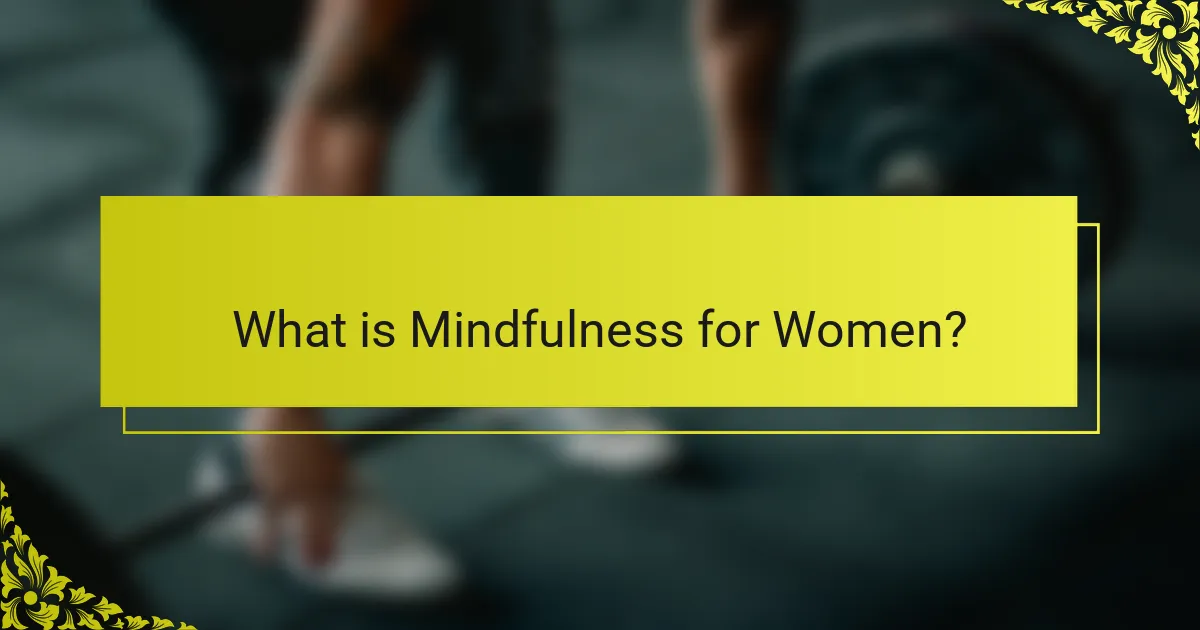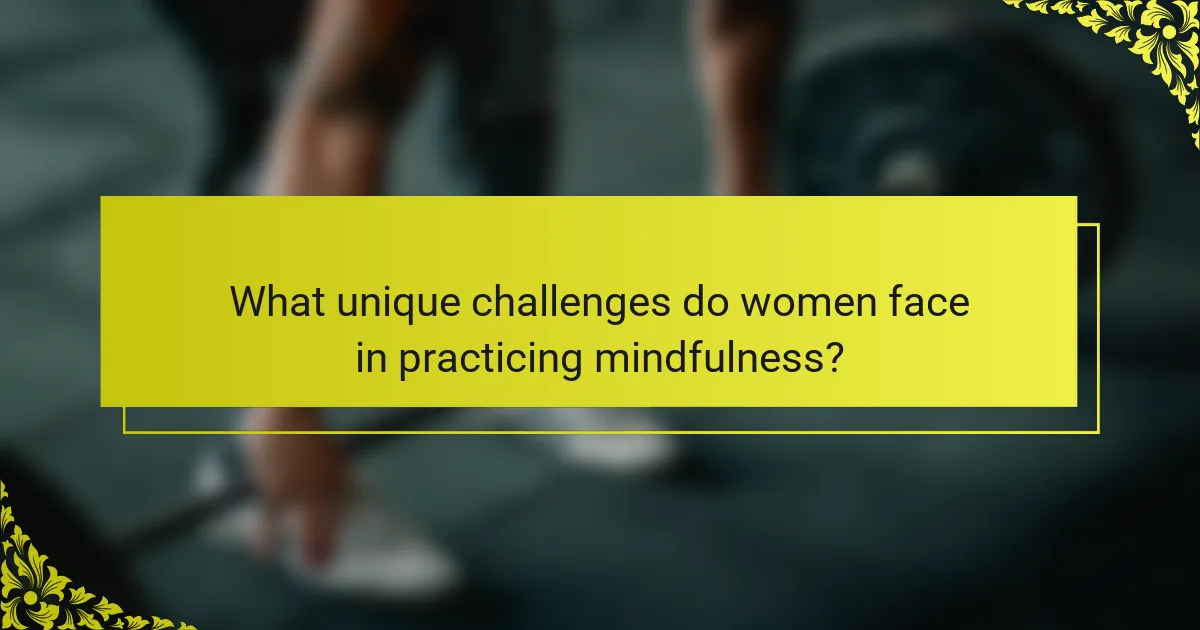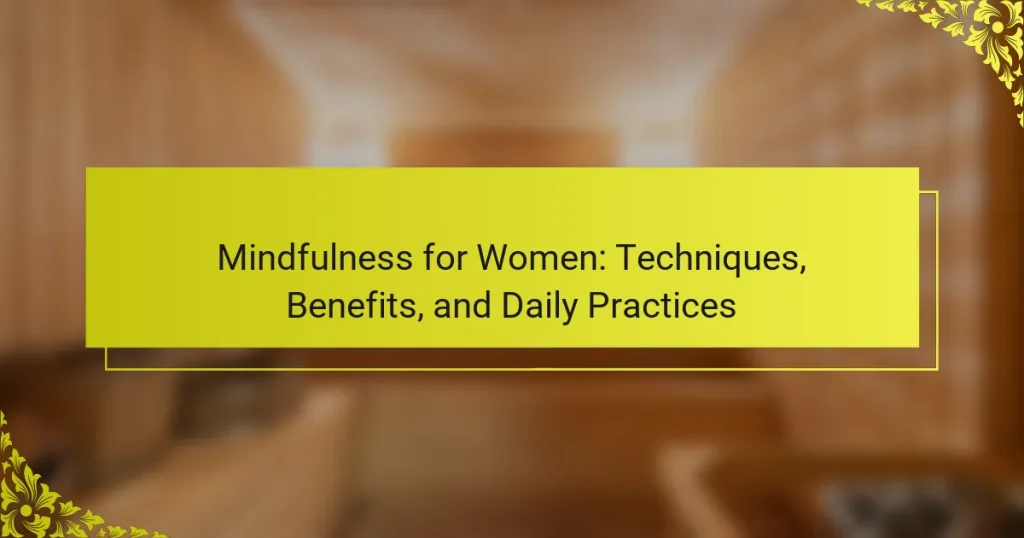Mindfulness enhances well-being and self-awareness for women. This article explores techniques like meditation and breathing exercises, highlights benefits such as reduced stress and improved emotional regulation, and offers daily practices for integration into routines. Addressing unique challenges women face in mindfulness, it also emphasizes the importance of cultural relevance and inclusivity in these practices.

What is Mindfulness for Women?
Mindfulness for women involves practices that enhance well-being and self-awareness. Techniques include meditation, breathing exercises, and body scans. Benefits encompass reduced stress, improved emotional regulation, and better focus. Daily practices can be integrated into routines, such as mindful walking or journaling. These methods empower women to cultivate resilience and a deeper connection to their experiences.
How does mindfulness specifically benefit women?
Mindfulness offers significant benefits for women, including enhanced emotional regulation and reduced stress levels. It promotes greater self-awareness, allowing women to connect with their feelings and thoughts more deeply. Research indicates that mindfulness practices can lead to improved mental health outcomes, such as decreased anxiety and depression. Additionally, women who engage in mindfulness report better relationships and increased resilience in facing life’s challenges.
What are the key techniques of mindfulness for women?
Mindfulness techniques for women focus on enhancing self-awareness and emotional well-being. Key techniques include meditation, mindful breathing, body scanning, and gratitude journaling. Each technique fosters presence, reduces stress, and promotes a positive mindset. Regular practice can lead to improved mental clarity and emotional resilience.
What daily practices can enhance mindfulness in women’s lives?
Daily practices that enhance mindfulness in women’s lives include meditation, journaling, and mindful breathing. These techniques promote self-awareness and emotional regulation. Regularly engaging in nature walks fosters a connection with the environment, while yoga integrates physical movement with mental focus. Incorporating gratitude exercises can shift perspectives positively. Each practice contributes uniquely to overall well-being and stress reduction.

What are the universal benefits of mindfulness for women?
Mindfulness offers numerous universal benefits for women, enhancing emotional well-being and resilience. It reduces stress, improves focus, and fosters self-acceptance. Regular practice can lead to better relationships and increased empathy. Studies show mindfulness can lower anxiety levels, promoting a sense of calm and clarity.
How does mindfulness improve mental health?
Mindfulness significantly enhances mental health by reducing stress, anxiety, and depression. It fosters emotional regulation and promotes overall well-being. Techniques such as meditation, deep breathing, and body scans help cultivate mindfulness. Research indicates that regular practice can lead to a 30% reduction in anxiety symptoms. Women particularly benefit from mindfulness as it addresses unique stressors they face, improving resilience and emotional balance.
What role does mindfulness play in stress reduction?
Mindfulness significantly reduces stress by promoting present-moment awareness. Techniques such as meditation, deep breathing, and body scans enhance emotional regulation and decrease anxiety levels. Research shows that regular mindfulness practice can lower cortisol, the stress hormone, leading to improved mental health. Women particularly benefit from mindfulness as it fosters resilience and enhances coping strategies in daily life.
How can mindfulness enhance emotional well-being?
Mindfulness enhances emotional well-being by promoting self-awareness and reducing stress. It encourages women to connect with their emotions, leading to improved mood and resilience. Techniques such as meditation and deep breathing can lower anxiety levels. Regular mindfulness practice has been shown to increase overall life satisfaction and emotional regulation.

What unique challenges do women face in practicing mindfulness?
Women face unique challenges in practicing mindfulness, including societal expectations, multitasking pressures, and self-doubt. These factors can hinder their ability to engage fully in mindfulness practices. Research indicates that women often juggle multiple roles, which can lead to fragmented attention during mindfulness sessions. Additionally, cultural norms may discourage women from prioritising self-care, making it difficult to carve out time for mindfulness. Addressing these challenges is essential for enhancing the effectiveness of mindfulness techniques tailored for women.
How do societal expectations affect women’s mindfulness practices?
Societal expectations can hinder women’s mindfulness practices by imposing stress and limiting personal expression. These pressures often lead to feelings of inadequacy and distraction, which undermine the effectiveness of mindfulness techniques. Research indicates that women frequently juggle multiple roles, affecting their ability to engage in consistent mindfulness. Additionally, societal norms may prioritise productivity over self-care, further complicating women’s commitment to mindfulness. As a result, cultivating a supportive environment is crucial for enhancing mindfulness practices among women.
What unique stressors impact women’s mental health?
Unique stressors impacting women’s mental health include societal expectations, work-life balance challenges, and reproductive health issues. These factors can lead to increased anxiety and depression. Mindfulness practices can help women manage stress by promoting self-awareness and emotional regulation. Techniques such as meditation, deep breathing, and journaling offer tangible benefits, enhancing resilience and overall well-being.

What rare attributes of mindfulness practices are beneficial for women?
Mindfulness practices offer unique benefits for women, including enhanced emotional resilience and improved self-compassion. These rare attributes can lead to a deeper understanding of personal experiences. Women often report increased intuition and connection to their bodies through mindfulness, fostering a sense of empowerment. Additionally, mindfulness can help alleviate symptoms of anxiety and depression, which are prevalent among women.
How does mindfulness foster resilience in women?
Mindfulness fosters resilience in women by enhancing emotional regulation and stress management. Practicing mindfulness allows women to develop greater awareness of their thoughts and feelings, enabling them to respond to challenges with clarity and calmness. This practice can lead to improved mental health outcomes, such as reduced anxiety and depression. Research indicates that mindfulness can increase self-compassion, which is crucial for resilience. By cultivating a non-judgmental attitude towards oneself, women can better navigate adversity and maintain a positive outlook.
What uncommon mindfulness techniques can women explore?
Women can explore uncommon mindfulness techniques such as forest bathing, sound meditation, and mindful walking. Forest bathing, or Shinrin-yoku, involves immersing oneself in nature, promoting relaxation and stress reduction. Sound meditation uses sound frequencies to enhance focus and emotional clarity. Mindful walking encourages awareness of each step, fostering connection to the present moment. These techniques offer unique benefits, enriching the mindfulness practice for women.

How can mindfulness be tailored to different cultural backgrounds?
Mindfulness can be adapted to various cultural backgrounds by incorporating culturally relevant practices and values. Techniques may include community-based activities, storytelling, and rituals that resonate with specific cultures.
For instance, in Indigenous cultures, mindfulness might involve nature-based practices, emphasizing connection to the land. In Asian cultures, mindfulness often integrates meditation and breathing techniques rooted in historical traditions.
Tailoring mindfulness practices ensures inclusivity and relevance, enhancing emotional well-being and fostering a sense of belonging for women from diverse backgrounds. This approach highlights the unique attribute of mindfulness as a flexible practice that can transcend cultural boundaries.
What practices resonate with women in diverse communities?
Mindfulness practices that resonate with women in diverse communities include meditation, deep breathing, and community sharing circles. These techniques promote mental well-being and foster connection. Meditation reduces stress and enhances focus, while deep breathing techniques help manage anxiety. Community sharing circles create a supportive environment, allowing women to express their experiences and emotions. These practices collectively empower women and promote resilience across various backgrounds.

What are the best practices for integrating mindfulness into daily life?
To integrate mindfulness into daily life, women can adopt simple yet effective practices. Start by setting aside a few minutes each day for focused breathing or meditation. Incorporate mindfulness into routine activities like eating, walking, or even during conversations. Creating a dedicated space for mindfulness practice can enhance focus and commitment. Additionally, journaling about daily experiences can deepen self-awareness and reflection. These practices not only reduce stress but also promote emotional well-being and resilience.
What common mistakes should women avoid when practicing mindfulness?
Women should avoid common mistakes like multitasking during mindfulness, setting unrealistic expectations, and neglecting consistency. These errors can hinder the effectiveness of mindfulness practices. Prioritising presence, setting achievable goals, and maintaining a regular routine enhance mindfulness benefits.
How can women maintain consistency in their mindfulness journey?
Women can maintain consistency in their mindfulness journey by establishing daily routines, setting realistic goals, and utilising mindfulness apps. Regular practice fosters a deeper connection to the techniques. Tracking progress can enhance motivation and accountability. Joining supportive communities provides encouragement and shared experiences, reinforcing commitment to mindfulness practices.
What expert insights can guide women’s mindfulness practices?
To enhance women’s mindfulness practices, experts recommend techniques that foster self-awareness and emotional regulation. Incorporating daily mindfulness exercises, such as meditation or mindful breathing, can reduce stress and improve mental clarity. Research indicates that women who engage in these practices report increased resilience and greater emotional balance. Additionally, community support through mindfulness groups can provide encouragement and accountability, enriching the practice.




